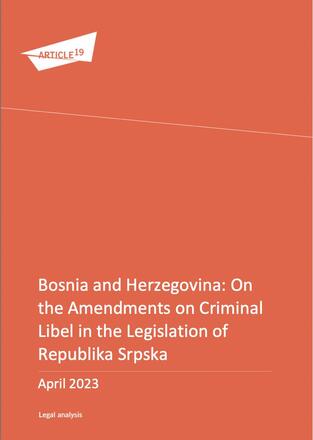
The proposed revisions to the Criminal Code of the Republika Srpska are the subject of this legal analysis by ARTICLE 19, which focuses on the reintroduction of criminal measures for insult, defamation, and other related offences. The authors of the analysis argue that the proposed amendments constitute needless and excessively harsh measures directed at criminalising insult and defamation. Such criminal laws represent a disproportionate and unduly harsh violation of the right to freedom of expression. The analysis finds the suggested amendments problematic. Specifically, the vague definition of Article 208 risks being repressive, having a punitive attitude and triggering a chilling effect toward the freedom of speech. The possibility of incurring into imprisonment as a consequence of having published unauthorised material or having displayed another person's records, images, or recordings is highly problematic. As stated by the UN Human Right Committee, regarding sanctions for defamation, “imprisonment is never an appropriate penalty”. Alternative remedies are suggested as more appropriate responses against unjustified attacks on one's reputation. Civil defamation laws are less intrusive and should be preferred to criminal provisions.
According to the authors, given the danger posed to freedom of expression, the proposed amendments must be rejected in their entirety, while current civil law's defamation provisions must be reviewed to ensure that they are in line with international standards. Any kind of restriction to freedom of expression must be provided by a precise law with a legitimate aim that does not infringe on the principles of proportionality and necessity. The authors argue that criminal defamation laws fail to comply with European and international human rights standards, eroding the right to freedom of expression. Specifically, ARTICLE 19 urges the repeal of Article 208a on insult and opposes the criminalization of defamation. The authors of the analysis advocate for the use of civil defamation laws to safeguard reputations, highlighting the significance of defences like reasonable justification and shifting the burden of proof to the plaintiff. Finally, they recommend the introduction of measures aimed at protecting media workers against SLAPPs.
Tags: Bosnia Herzegovina Defamation and Libel Freedom of expressionThe content of this article can be used according to the terms of Creative Commons: Attribution-NonCommercial 4.0 International (CC BY-NC 4.0) . To do so use the the wording "this article was originally published on the Resource Centre on Media Freedom in Europe" including a direct active link to the original article page.

